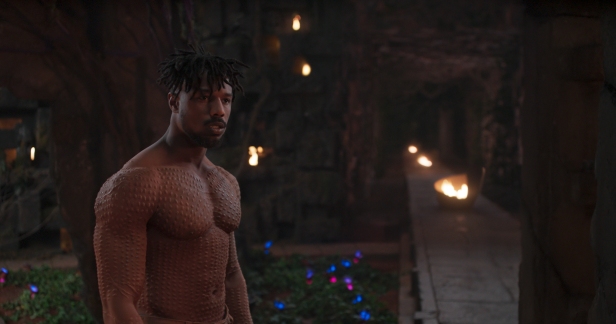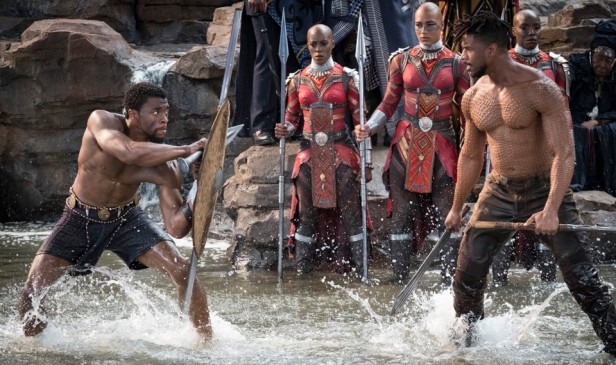We are in year 10 with the Marvel Cinematic Universe (MCU) and the opening ceremony to celebrate its decade of dominance kicks off in grand fashion.
With Black Panther, director/writer Ryan Coogler (Creed, Fruitvale Station) has not only crafted a comic book movie featuring a superhero doing superhero things, he created a comic book movie featuring a superhero carrying a purpose and a voice. Behind the stylized sequences of action and violence, there’s relevant social commentary that corresponds with the actual world around us; past, present and future. This is a very much a comic book movie first — that Marvel Studios’ logo is why we’re here — but behind the dust there’s so much more at stake.
Following the events after Captain America: Civil War (2016), T’Challa (Chadwick Boseman) returns to his home of Wakanda — a secluded, secretive, technologically advanced African nation — to take his rightful place as king. However, a new enemy named Erik Killmonger (Michael B. Jordan) rises from the shadows and threatens the throne as he seeks the power of the Black Panther to restore the world as he sees fit. The fate of Wakanda and the entire world rests on the shoulders of righteousness.

What separates Black Panther from your everyday superhero movie is its thematic elements and the conflict between reality and fantasy. Wakanda is very much a fantasy to outsiders looking in. The secrecy of the nation and its innovative technology shelter its citizens from what’s happening beyond the hidden barrier guarding the city streets. This concept is what separates Killmonger from your average comic book villain. He’s not hellbent on destroying the world for pleasure, he believes he’s doing the right thing. Wakanda has the resources to save a world that’s on the brink of destroying itself so why shelter it?
The brilliant performance given by Michael B. Jordan as Killmonger delivers power and a great deal emotion that not only offers conflict to our hero, but to us as audience members. As we sit and watch the chaos on the screen, there’s a method to Killmonger’s madness because he’s not entirely wrong with what he believes in. He’s arguably the film’s most intriguing character, sending T’Challa to the passenger seat at times. Coogler, along with the help of co-writer Joe Robert Cole, does an incredible job with delivering Killmonger as not only a villain, but a character with depth and an emotional arc. He’s shaped by the harshness of reality, as our hero hides away from the world in his sci-fi driven utopian fantasy.
For the sake of superhero goodness, we’re presented with the concept of good vs. evil, but what’s beneath the surface is more-so a battle between best vs. better. Our main antagonist and protagonist have seen power succumb to corruption, just in different ways. Our “hero” T’Challa decides the best option for Wakanda to strive is to hide away behind a barrier to let the rest of the world fight for themselves. Our “villain” Killmonger decides that the best way to enact change and save a segment of the world’s population from oppression is to become part of the system and overthrow it from the inside. This is a central conflict that, once raised, goes full throttle into changing what we’ve been accustomed to seeing in the superhero realm. Politics, philosophy and emotional storytelling is what molds Black Panther and separates it from the rest of the MCU.

One of Black Panther‘s strongest features comes from its incredible cast. Aside from T’Challa and Killmonger, there are a number of secondary characters mixed in between to forward this story to excellence. Danai Gurira (who’s most known for her character Michonne on The Walking Dead) portrays an “extremely proud” Wakandan warrior named Okaye. She is the leader of the country’s most fiercest female warriors known as the Dora Milaje. Each and every warrior we’re introduced to presents power and authority, but Okaye has that extra pep in her step. Every time she graces the screen, she owns every minute of it.
Lupita Nyong’o portrays T’Challa’s former lover and current Wakandan spy named Nakia, and Letitia Wright portrays T’Challa’s 16-year old sister named Shuri. Responsible for designing new Wakandan technology day in and day out, Shuri is presented to have the most intelligent mind on the planet; and it shows. There are multiple scenes through the film that she steals with just her wit and intelligence alone. It’s going to be interesting to see how she’s going to be utilized in future MCU installments knowing that Tony Stark interaction is right around the corner.
From a technical filmmaking point of view, Black Panther is arguably Marvel Studios’ best looking movie. From the vibrant colors of Wakanda to the feisty designs of the outfits and armors of its citizens, there is a lot to love as each frame graces the screen. Coogler is incredible with how he captures action and intensity with his fight sequences — as we have seen with Creed — and there’s more of the same here with Black Panther. He utilizes handheld shots to get up close and personal with the action, and as beautiful as the backdrops present themselves, he centers on the characters and attracts your attention into each punch and kick. Fight choreography is displayed on a very high level and the real winner of each fight is us; the audience.
The music is also a major element that captures this film’s intensity and character. Aside from the soundtrack curated by Kendrick Lamar, Ludwig Göransson composes a masterful score that offers unique African percussions and cinematic booms that propel each scene to a grander scale.

Is Black Panther a perfect film? Not entirely; no movie is. There are a few CGI blemishes here and there, some of the story beats in the beginning of the film feel more like generic action filler before it gets into the crux of Coogler’s overall narrative, and Killmonger is a no-show for about 45 minutes after he is first introduced. However, these are minor nitpicks once broken down and the fact that these details don’t drag the overall story is a testament to Coogler’s filmmaking brilliance.
This movie couldn’t have come at a better time because it opens doors for not only the future of the MCU, but superhero movies in general. We’ve seen a few titles transcend the genre in the past (The Dark Knight, Logan, Wonder Woman), and Black Panther only adds to the résumé. On one side, with Avengers: Infinity War only months away, Wakanda is needed now more than ever. The fate of the future depends on it. On the other side, there is a strong political message beneath the concept of Wakanda that reflects the actual world we live in. “In the time of crisis, the wise man builds bridges. The foolish man builds barriers.”
All hail Coogler.
FINAL SCORE: A


